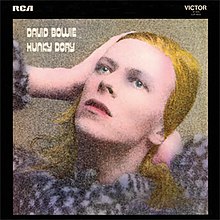
Back Hunky Dory Czech Hunky Dory German Hunky Dory Spanish رضایتمندانه Persian Hunky Dory Finnish Hunky Dory French Hunky Dory Galician Hunky Dory HE Hunky Dory Hungarian Hunky Dory Italian
| Hunky Dory | ||||
|---|---|---|---|---|
 UK cover (the original US cover bears no title) | ||||
| Studio album by | ||||
| Released | 17 December 1971 | |||
| Recorded | 8 June – 6 August 1971 | |||
| Studio | Trident (London) | |||
| Genre | ||||
| Length | 41:50 | |||
| Label | RCA | |||
| Producer |
| |||
| David Bowie chronology | ||||
| ||||
| Singles from Hunky Dory | ||||
| ||||
Hunky Dory is the fourth studio album by the English musician David Bowie, released in the United Kingdom on 17 December 1971 through RCA Records. Following a break from touring and recording, Bowie settled down to write new songs, composing on piano rather than guitar as in earlier works. Bowie assembled the guitarist Mick Ronson, the bassist Trevor Bolder, and the drummer Mick Woodmansey, and began to record a new album in mid-1971 at Trident Studios in London. Rick Wakeman contributed on piano shortly before joining Yes. Bowie co-produced the album with Ken Scott, who had engineered Bowie's previous two records.
Compared to the guitar-driven hard rock sound of The Man Who Sold the World, Bowie opted for a warmer, more melodic piano-based pop rock and art pop style on Hunky Dory. His lyrical concerns on the record range from the compulsive nature of artistic reinvention on "Changes", to occultism and Nietzschean philosophy on "Oh! You Pretty Things" and "Quicksand"; several songs make cultural and literary references. He was also inspired by his United States tour to write songs dedicated to three American icons: Andy Warhol, Bob Dylan, and Lou Reed. The song "Kooks" was dedicated to Bowie's newborn son Duncan. The album's cover artwork, photographed in monochrome and subsequently recoloured, features Bowie in a pose inspired by actresses of the Hollywood Golden Age.
RCA offered little promotion for Hunky Dory and its lead single "Changes", wary that Bowie would transform his image shortly. Thus, despite very positive reviews from the British and American music press, the album initially sold poorly and failed to chart. After the commercial breakthrough of Bowie's Ziggy Stardust album in 1972, Hunky Dory garnered renewed interest, with sales peaking at number three on the UK Albums Chart. Retrospectively, Hunky Dory has been critically acclaimed as one of Bowie's best works, and features on several lists of the greatest albums of all time. Within the context of his career, Hunky Dory is considered the album where "Bowie starts to become Bowie", definitively discovering his voice and style.[1]